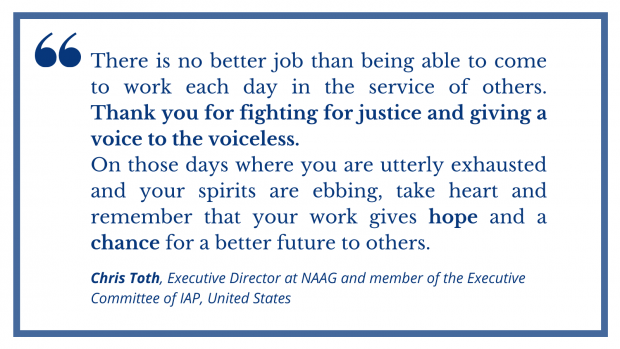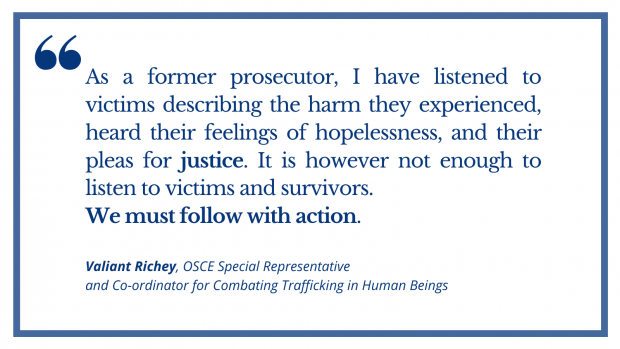Why focusing on victims matters: OSCE’s webinar series on victim-centered investigation and prosecution
The Office of the Special Representative and Co-ordinator of Trafficking in Human Beings (OCR/CTHB) recently concluded a five-week webinar series titled “Trafficking in Human Beings - Investigating and Prosecuting Cases Effectively Using Victim-Centered Approaches”. The initiative was organized in collaboration with the International Association of Prosecutors (IAP) and National Attorneys General Training and Research Institute (NAGTRI), and in partnership with AEquitas and the International Justice Mission (IJM).
Experts and practitioners from three continents unite
Thirty-six law enforcement and prosecutorial practitioners from 13 different countries in Europe and America joined online to better understand how to apply a victim-centered, trauma-informed, and human rights-focused approach to the prosecution of human trafficking cases.
— OSCE Anti-Trafficking (@osce_cthb) November 20, 2020
— OSCE Anti-Trafficking (@osce_cthb) October 29, 2020
Participants were offered a combination of lectures, practical exercises, and roundtable discussions. The event served as a unique opportunity to invite a diverse group of professionals, who would not normally work together, to collaborate and share their experiences.
The Executive Director of the National Association of Attorneys General (NAAG) and IAP Executive Committee Member, Chris Toth, highlighted that international co-operation is crucial in fighting transnational crimes like human trafficking, “so this type of collaboration, this type of relationship building, is extremely important, to becoming more effective at ending human trafficking”.

Why focus on the victims?
It may seem obvious that victims of human trafficking should be a priority when prosecuting a case. However, this is often not the reality.
The criminal justice response focuses more frequently on holding offenders accountable first, which though fundamental, may not be the most important aspect for the recovery of the victim. As stated by prosecutor Nancy Rothstein, from the Massachusetts Attorney General Office in the United States “it is possible to have success in prosecuting a case where the victim refused to testify, and this is also a central part of the victim-centered approach”.
Trafficking in human beings is a complex crime, which causes severe trauma in victims. Avoiding re-victimization and re-traumatization is imperative. To ensure this, victims’ physical and psychological wellbeing must be taken into consideration throughout all criminal proceedings.
Victims should never be treated as criminals. Instead, law enforcement and the prosecution should lessen the burden exacted on victims by building cases that rely on additional proof and not solely on their statements, and not obliging victims to collaborate throughout the entire criminal justice process.
— OSCE Anti-Trafficking (@osce_cthb) November 5, 2020
This process can take years, and victims might want to, and should have the right to, go back to where they lived before being trafficked. Participating in the criminal process can be psychologically harmful, as victims re-live traumatic experiences in court, often in the presence of their trafficker.
Many victims prioritize moving on with their lives and returning to normalcy as soon as possible. The OCR/CTHB always advocates for the “social path” for identification of trafficked victims, according to which, presumed victims of trafficking can access services and assistance independently from their collaboration with the authorities.
Including survivors to the conversation
An important component of the webinar series was the active participation of survivors, who were present in every session.
Listening to survivors and taking into account survivor-led solutions are crucial components for establishing effective anti-trafficking responses. Their unique expertise and point of view must also be taken in consideration and leveraged to better assist and protect victims. Victoria Nyanjura, survivor and global partnership consultant at IJM, said that according to her, a victim-centered approach means, “listening to survivors to know what their specific needs are on different issues and incorporating them into the programme design that would uplift their status.”
— OSCE Anti-Trafficking (@osce_cthb) October 15, 2020
A similar message was echoed by Karly Church, survivor and human trafficking crisis intervention counselor for the victim’s services of the Durham Region (Canada), who stated that with this type of approach “agencies will work collaboratively to ensure that victims’ unique needs will be met. All while walking beside them throughout their recovery.”
Next steps
Valiant Richey, OSCE Special Representative and Co-ordinator for Combating Trafficking in Human Beings, wrapped up the webinar series by asking how this initiative could be replicated and scaled to reach more people with information shared in the webinar series.

A first step into this direction was the organization of a capacity-building expert meeting specifically focused on the implementation of a victim-centered approach in the prosecution of trafficking cases.

